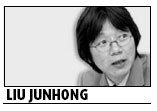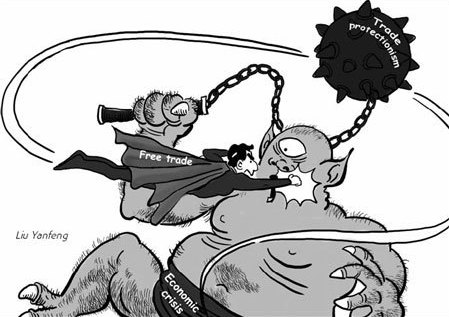Group interests holding free trade to ransom

The latest economic leaders' meeting of Asia-Pacific Economic Cooperation (APEC) issued a statement unanimously opposing trade protectionism, reiterating the APEC spirit and calling upon nations to refrain from erecting new barriers against investment and trade. It also urged states to protect the WTO principle of multilateral free trade and join hands in preventing the financial crisis from worsening.
Today the global economy is slipping closer toward a full-blown recession as the US financial crisis continues to deepen and spread. A new wave of trade protectionism led by developed economies such as the United States, European Union and Japan is gaining momentum. The conflict between developed and developing nations over their development needs is resurfacing as the inherent problems of the US, EU and Japan flare up.
One of those problems is that the economic policies of developed countries emphasize their own national interests when handling crises. They invariably turn introvert and to peer bonding, which leads to policy clashes among major powers within the group and makes it difficult for the system of international coordination to function.
Another problem is that the monopolistic tendency among cross-national conglomerates of developed countries is getting worse everyday. For instance, the US and EU have handled law suits against Japanese corporations for monopoly as the conflict between developed nations over monopoly and anti-monopoly issues escalates. This has resulted in the increase of heavy penalties against aggressive companies and consequent appeals. Conflicts of national interests are growing in intensity.
Yet another problem is that, amid the worldwide stock market slump, the cash-loaded Japanese conglomerates have geared up overseas acquisitions in their drives to expand globally. Such moves are naturally pouring fuel to the heating rivalry between Japanese, the US and EU industries.
These developments directly lead to a situation where the world economy is challenged by a capital game play dominated by developed countries and threatened by a possible collapse of world trade because of such conflicts of interests.
Globalization and the "system of managed free trade" led by the World Trade Organization (WTO) are now seriously challenged more than ever.
Therefore, as the most dynamic component of the world economy, the Asia-Pacific regional economy's ability to sustain free trade will determine whether the world trade and investment ties can sustain the "keynote of managed opening and liberty". It will also determine if the world economy can stay on the track of coordinated development.
The latest APEC economic leaders' meeting made it clear that the member economies will stick to the principle of actively promoting, implementing in phases and separately handling trade liberalization. It also resolved to uphold the forum's spirit of "free, relaxed and non-restrictive" cooperation, oppose any form of trade protectionism, prevent the world from repeating the political crisis following the Great Depression of the 1930s, thereby protecting the harmony and stability of the world economy and politics.
There is no doubt APEC's insistence on pushing forward the Doha round of WTO talks to ensure the implementation of free multilateral trade and investment is of great significance to the sustained and steady development of the world economy.
In essence the focus of contradictions in the Doha round of WTO admission talks is that the agricultural policies of the US, EU and Japan are in one another's way. This, however, has nothing to do with the fact that emerging economies and developing nations disagree with developed countries on the rules of investment.

The unannounced understanding and back-tracking on policies between Japan and the EU, in particular, has exacerbated the disputes among them.
As a matter of fact, Japan and the EU reached unannounced understanding on agricultural policies during the Group of Eight summit in Hokkaido, Japan, earlier this year, but the latter went back on its words and refused to honor its promise to Japan when the Doha round of WTO talks resumed. The one-sided turnaround caused the policy conflicts between the two sides to escalate at the expense of mutual confidence as they accused each other of dishonesty.
To deal with the agricultural policy pressure from the US-EU alliance, Japan used the influence of developing nations such as China and India to its advantage and cleverly diverted international attention to the disputes between developing countries and the US.
Thus Japan successfully pushed China and India to the front of the policy dispute between developing nations and the US. It also worked really hard to sell the idea that it was the dispute between the US and developing countries that was mainly responsible for the collapse of the Doha round of WTO talks.
Truth is, to protect the interest of its own farm industry, Japan would have fought the US-EU alliance all the way and made it impossible for the Doha round to reach any agreement with or without China and India speaking up on the developing world's behalf.
This shows it ultimately depends on the ability of Japan, the US and EU to coordinate their agricultural policies, instead of sticking to their exclusively self-serving principles, for the Doha round of WTO talks to reach consensus on advancing worldwide multilateral free trade.
Today the financial crisis is deepening everyday and there is no light at the end of the tunnel yet. The Washington Summit established a "principle" that caters to the interest of each and every party involved one way or another, but it stopped short of a detailed manual for implementation.
The US, EU and Japan are expected to continue their earnest fight over international financial authority in the future and carry out their self-serving policies to the letter. They are not prepared to really increase fiscal spending. Instead they will only tweak and polish their financial and tax policies in a bid to avoid the outcome of their added fiscal expenditure benefiting others.
The United Kingdom, for example, has openly voiced its concern that the positive effect of increased fiscal spending will show up in other economies and therefore favors tax reduction over the policy of proactive fiscal expansion.
The Taro Aso cabinet of Japan has proposed a comprehensive economic solution worth 26.9 trillion yen, but real fiscal spending will be just 5 trillion yen, accounting for only 18 percent of the total package, while the rest is mostly framework pledge.
While Washington's $700-billion rescue plan will almost entirely go to clearing up the country's bad debt mess, the EU policies are also geared overwhelmingly toward protecting its own interests. As such the global market confidence will be hard to restore, the world economy difficult to remain in open mode, trade protectionism impossible to prevent, while regionalization and group tendency will stay "popular".
Stumbling blocks are inevitable for globalization because it is based on trade liberalization. It is very hard for the world economy to avoid recession as long as it is stuck in the present fix. Pursuing only the revival of the value of securities and fixed assets merely serves to cover up the real problem rather than solve it, let alone mitigate the crisis.
The world economy will slip faster into recession if developed countries continue to hold back on taking effective measures. Without such measures the current financial crisis will surely advance to "Act III", when the real economy withers into recession, bringing large numbers of banks down like falling dominos around the world.
In this backdrop it is the common responsibility of the whole world to prevent the real economy from crashing into recession with "concerted policies", because we are in this together. This is the only way to end the crisis before it proceeds to the "Act III".
The author is a researcher with China Institute of Contemporary International Relations
(China Daily 12/09/2008 page9)














